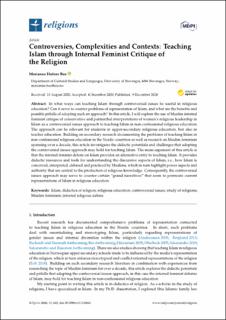Controversies, Complexities and Contexts: Teaching Islam through Internal Feminist Critique of the Religion
Peer reviewed, Journal article
Published version
Permanent lenke
https://hdl.handle.net/11250/2733433Utgivelsesdato
2020-12Metadata
Vis full innførselSamlinger
Originalversjon
Bøe, M.H. (2020) Controversies, Complexities and Contexts: Teaching Islam through Internal Feminist Critique of the Religion. Religions, 11(12), 662. 10.3390/rel11120662Sammendrag
In what ways can teaching Islam through controversial issues be useful in religious education? Can it serve to counter problems of representation of Islam, and what are the benefits and possible pitfalls of adopting such an approach? In this article, I will explore the use of Muslim internal feminist critique of conservative and patriarchal interpretations of women’s religious leadership in Islam as a controversial issues approach to teaching Islam in non-confessional religious education. The approach can be relevant for students in upper-secondary religious education, but also in teacher education. Building on secondary research documenting the problems of teaching Islam in non-confessional religious education in the Nordic countries as well as research on Muslim feminism spanning over a decade, this article investigates the didactic potentials and challenges that adopting the controversial issues approach may hold for teaching Islam. The main argument of this article is that the internal feminist debate on Islam provides an alternative entry to teaching Islam. It provides didactic resources and tools for understanding the discursive aspects of Islam, i.e., how Islam is conceived, interpreted, debated and practiced by Muslims, which in turn highlight power aspects and authority that are central to the production of religious knowledge. Consequently, the controversial issues approach may serve to counter certain “grand narratives” that seem to permeate current representations of Islam in religious education.

